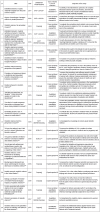Obstetric violence in the daily routine of care and its characteristics
- PMID: 30517571
- PMCID: PMC6280177
- DOI: 10.1590/1518-8345.2450.3069
Obstetric violence in the daily routine of care and its characteristics
Abstract
Objective: to analyze the scientific production on obstetric violence by identifying and discussing its main characteristics in the routine care for the pregnant-puerperal cycle.
Method: integrative literature review of 24 publications indexed in the Cumulative Index to Nursing and Allied Health Literature, Medical Literature Analysis and Retrieval System Online, SciVerse Scopus, Web of Science and the Scientific Electronic Library Online and Virtual Health Library.
Results: the publications are intensified from 2015 onwards and present methodological designs of quantitative and qualitative nature. In the discussion, we first address the concept of obstetric violence and its different forms of occurrence in care. Then, interfaces of the phenomenon are presented with reflections related to the conception of gender, the different actors involved, the institutionalization, and the invisibility and trivialization of the event. Finally, strategies to combat the problem are presented through academic training, women's awareness, proposals of social mobilization, and creation of public policies and laws.
Conclusion: obstetric violence portrays a violation of human rights and a serious public health problem and is revealed in the form of negligent, reckless, omissive, discriminatory and disrespectful acts practiced by health professionals and legitimized by the symbolic relations of power that naturalize and trivialize their occurrence.
Figures





References
-
- Torres JA, Santos I, Vargens OMC. Constructing a care technology conception in obstetric nursing: a sociopoetic study. Texto Contexto Enferm. 2008;17(4):656–664. http://www.scielo.br/pdf/tce/v17n4/05.pdf
-
- Sena LM, Tesser CD. Obstetric violence in Brazil and cyberactivism of mothers: report of two experiences. Interface Comun Saúde Educ. 2017;21(60):209–220. http://www.scielo.br/pdf/icse/v21n60/1807-5762-icse-1807-576220150896.pdf
-
- Aguiar JM, d’Oliveira AFPL. Institutional violence in public maternity hospitals: the women’s view. Interface Comun Saúde Educ. 2011;15(36):79–92. http://www.scielo.br/pdf/icse/v15n36/aop4010.pdfhttp://www.scielo.br/pdf...
-
- Bellón Sánchez S. Obstetric violence from the contributions of feminist criticism and biopolitics. Dilemata Int J Appl Ethics. 2015;7(18):93–111. http://www.dilemata.net/revista/index.php/dilemata/article/view/374/379
-
- World Health Organization . The prevention and elimination of disrespect and abuse during facility-nbased chidlbirth. Genebra: WHO; 2014. http://apps.who.int/iris/bitstream/10665/134588/1/WHO_RHR_14.23_eng.pdf?...
Publication types
MeSH terms
LinkOut - more resources
Full Text Sources
Medical

